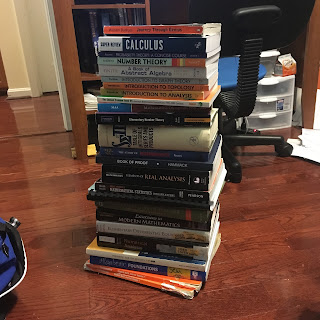This is a spontaneous blog post in that I didn't plan on writing about this beforehand. I know most of my friends know that I like math, but I figure I can write something mildly interesting out of it.
Math Mountain
Although my dream career is in meteorology, mathematics has been a constant presence in my life since I started school. I remember in Kindergarten the teachers pulled me aside to have me count as high as I possibly can and they had to stop me somewhere around 407 (though with that memory being about 18 years old, is not the clearest). I won't say I'm the best in math, but I've generally had an easy time learning most of it throughout elementary, middle, and early high school. My first real test of mathematical challenge was during my junior year of high school: AP Calculus AB/BC. For the first time I wasn't generally smooth sailing through a math course and struggled to grasp some of the concepts such as finding the slope of a curve at a specific point using difference quotient (finding the limit as h approaches 0 of (f(x+h) - f(x))/h, though eventually I grasped it) and Taylor and Maclaurin series. Thankfully I did well enough on the AP exam, but the ride was just beginning for my journey into math. In college, I went through another semester of Calculus, which was interesting as now I could find the integral of an object in three-space in Cartesian, cylindrical, and polar coordinates, along with having learned some theorems regarding path integrals (said theorems were relevant to my studies in meteorology). My younger self saw Calculus as the peak of mathematical knowledge, oh how wrong I was. During my college days, I learned there was more to math than plugging and chugging numbers. Courses in topics such as Abstract Algebra and Real Analysis taught me about the structures of math and why some mathematical concept works or why lower level math courses can get away with approximate methods. If I had to list my favorite math courses in college, they would be Abstract Algebra, Number Theory, Numerical Analysis, and Math Proof. Though I will have to admit to some bias with Abstract Algebra and Number Theory as they were taught by Dr. B. Ikenaga and he has a reputation as an excellent professor at Millersville. Now that I'm out of school, where will I go next in my math journey? Who knows? I may delve deeper into Abstract Algebra or give mathematical statistics another whirl or have way too much fun with matrices in Linear Algebra. I'll end this post with my opinion: If you can add, subtract, multiply, divide, and count groups of objects such as the fingers on your hand, then you can be good at math.

No comments:
Post a Comment